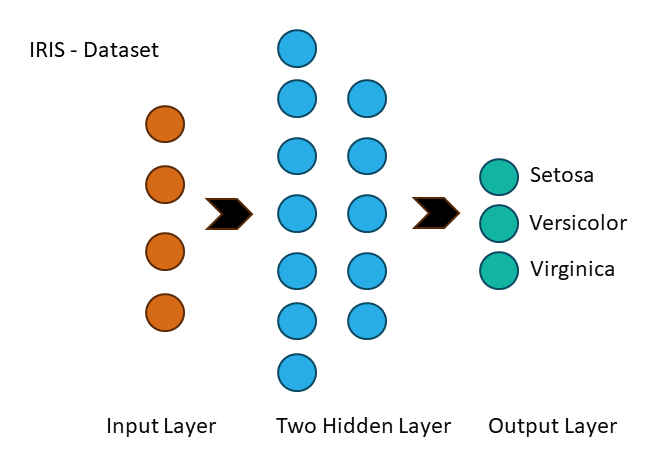EDUX is a user-friendly library for solving problems with a machine learning approach.
EDUX supports a variety of machine learning algorithms including:
- Multilayer Perceptron (Neural Network): Suitable for regression and classification problems, MLPs can approximate non-linear functions.
- K Nearest Neighbors: A simple, instance-based learning algorithm used for classification and regression.
- Decision Tree: Offers visual and explicitly laid out decision making based on input features.
- Support Vector Machine: Effective for binary classification, and can be adapted for multi-class problems.
- RandomForest: An ensemble method providing high accuracy through building multiple decision trees.
Edux supports a variety of image augmentations, which can be used to increase the performance of your model.




AugmentationSequence augmentationSequence=
new AugmentationBuilder()
.addAugmentation(new ResizeAugmentation(250,250))
.addAugmentation(new ColorEqualizationAugmentation())
.build();
BufferedImage augmentedImage=augmentationSequence.applyTo(image); AugmentationSequence augmentationSequence=
new AugmentationBuilder()
.addAugmentation(new ResizeAugmentation(250,250))
.addAugmentation(new ColorEqualizationAugmentation())
.addAugmentation(new BlurAugmentation(25))
.addAugmentation(new RandomDeleteAugmentation(10,20,20))
.build()
.run(trainImagesDir,numberOfWorkers,outputDir);We run all algorithms on the same dataset and compare the results. Benchmark
The main goal of this project is to create a user-friendly library for solving problems using a machine learning approach. The library is designed to be easy to use, enabling the solution of problems with just a few lines of code.
The library currently supports:
- Multilayer Perceptron (Neural Network)
- K Nearest Neighbors
- Decision Tree
- Support Vector Machine
- RandomForest
Include the library as a dependency in your Java project file.
implementation 'io.github.samyssmile:edux:1.0.7'
<dependency>
<groupId>io.github.samyssmile</groupId>
<artifactId>edux</artifactId>
<version>1.0.7</version>
</dependency>
EDUX supports Nvidia GPU acceleration.
- Nvidia GPU with CUDA support
- CUDA Toolkit 11.8
This section guides you through using EDUX to process your dataset, configure a multilayer perceptron (Multilayer Neural Network), perform training and evaluation.
A multi-layer perceptron (MLP) is a feedforward artificial neural network that generates a set of outputs from a set of input features. An MLP is characterized by several layers of input nodes connected as a directed graph between the input and output layers.
Firstly, we will load and prepare the IRIS dataset:
| sepal.length | sepal.width | petal.length | petal.width | variety |
|---|---|---|---|---|
| 5.1 | 3.5 | 1.4 | 0.2 | Setosa |
var featureColumnIndices=new int[]{0,1,2,3}; // Specify your feature columns
var targetColumnIndex=4; // Specify your target column
var dataProcessor=new DataProcessor(new CSVIDataReader());
var dataset=dataProcessor.loadDataSetFromCSV(
"path/to/your/data.csv", // Replace with your CSV file path
',', // CSV delimiter
true, // Whether to skip the header
featureColumnIndices,
targetColumnIndex
);
dataset.shuffle();
dataset.normalize();
dataProcessor.split(0.8); // Replace with your train-test split ratioExtract the features and labels for both training and test sets:
var trainFeatures=dataProcessor.getTrainFeatures(featureColumnIndices);
var trainLabels=dataProcessor.getTrainLabels(targetColumnIndex);
var testFeatures=dataProcessor.getTestFeatures(featureColumnIndices);
var testLabels=dataProcessor.getTestLabels(targetColumnIndex);var networkConfiguration=new NetworkConfiguration(
trainFeatures[0].length, // Number of input neurons
List.of(128,256,512), // Number of neurons in each hidden layer
3, // Number of output neurons
0.01, // Learning rate
300, // Number of epochs
ActivationFunction.LEAKY_RELU, // Activation function for hidden layers
ActivationFunction.SOFTMAX, // Activation function for output layer
LossFunction.CATEGORICAL_CROSS_ENTROPY, // Loss function
Initialization.XAVIER, // Weight initialization for hidden layers
Initialization.XAVIER // Weight initialization for output layer
);MultilayerPerceptron multilayerPerceptron=new MultilayerPerceptron(
networkConfiguration,
testFeatures,
testLabels
);
multilayerPerceptron.train(trainFeatures,trainLabels);
multilayerPerceptron.evaluate(testFeatures,testLabels);...
MultilayerPerceptron - Best accuracy after restoring best MLP model: 98,56%
You can find more fully working examples for all algorithms in the examples folder.
For examples we use the
Contributions are warmly welcomed! If you find a bug, please create an issue with a detailed description of the problem. If you wish to suggest an improvement or fix a bug, please make a pull request. Also checkout the Rules and Guidelines page for more information.
